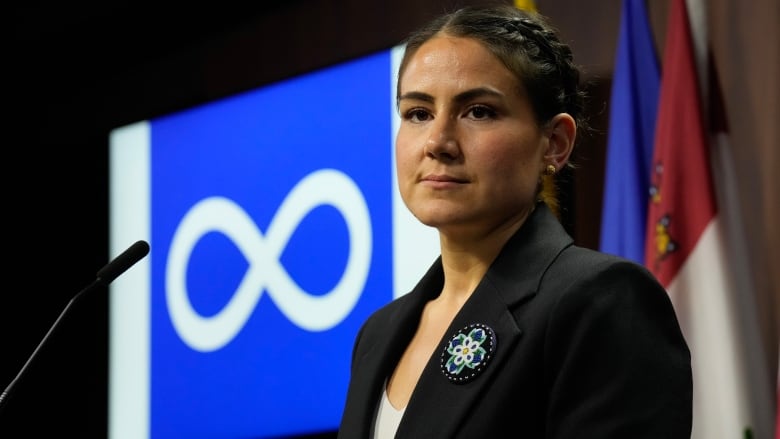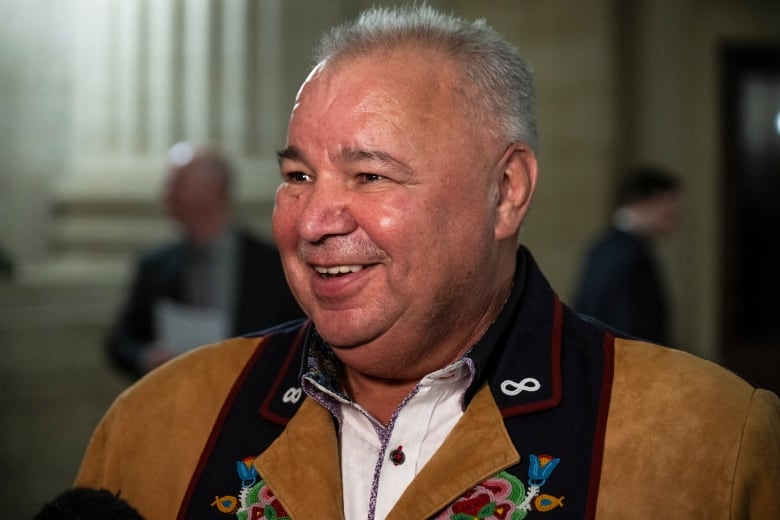Mtis National Council president blames 'ambitions of a few' after Sask. withdraws
Cassidy Caron says the need for a strong national voice has not and will not change

The Mtis National Council's outgoing president broke her silence this week after the council's Saskatchewan member cut ties, throwing the national organization's future in doubt.
Cassidy Caron, who is not seeking re-election when her three-year term ends next week, says she has proposed a plan for the council's ongoing existence, andsuggests the splintering is driven bya self-interested few rather than the best interests of the entire Mtis Nation.
"I believe that some leaders have forgotten about our greater responsibility to each other and to nationhood," Caron said in a Sept. 23 statement.
"The unity we are striving for is being divided by the self-interest, impatience, and ambitions of a few, rather than the collective aspirations or values of our people. The need for a strong national voice, collaborative engagement, and respectful dialogue between all Mtis has not and will not change."
The national council was formed in 1983 when three Prairie Mtis associations split from the Native Council of Canada, which then included non-status First Nations people, to advocate for Mtis rights directly at the federal level.
Last week, the Mtis Nation-Saskatchewan broke from the organization, citing its concerns the Mtis Nation of Ontario (MNO) "continues to represent significant numbers of people who are not Mtis," a statement MNO denies.
The Manitoba Mtis Federation (MMF)brokefrom the council in 2021, also citing concerns about the Ontario affiliate.
Caron was elected the dayafter Manitoba's exit. She promised to clean up the organization and do politics right.
Caron's latest statement says she worked tirelessly to reform the organization since that assembly, adding, "Together we have re-built the MNC into a transparent, accountable, and ethical organization."
Earlier this month, Caron said the council's general assembly and presidential election, originally scheduled for this month, werepostponed until November because an expert panel investigating theOntario communities hasn't finished its report.
She addedher term would end as scheduled andthe council's board of directors could appoint an existing employee to ensure the council's operations continue until the election.
The organization's corporate bylaws say board meetings "shall include the president and two of the founding members," meaning the Manitoba, Saskatchewan or Alberta members.

MMF President David Chartrand told CBC Indigenous last week this means the organization, in his view, istechnically unable to hold meetings and officially defunct.
Caron's latest statement offers no indication she intends to stay on until the election in the wake of Saskatchewan's split. Nor does it explain how an interim president or caretaker could be appointed.
However, she said the council implemented a successful plan following Manitoba's withdrawal, adding she had once again "proposed a promising way forward for the MNC's ongoing existence, reform, and success" after the latest break.
That proposal was not made public and it's not clear what it entails.
B.C. member to outline position
Meanwhile, councilmember Mtis Nation British Columbia said this week its board has a duty to articulate a position and clarify B.C.'s role in the council but pledged to consult communities first.
"We will not be swayed by outside influences or be forced to act hastily," said MNBC President Walter Mineault in a Sept. 24 statement on behalf of the group's board of directors.
The Otipemisiwak Mtis Government, formerly Mtis Nation of Alberta, did not explicitly take a position on its role in the national organization following Saskatchewan's withdrawal but promised to continue its efforts toward self-government.
"We remain committed to the formal recognition of our inherent rights to self-determination and self-government," said President Andrea Sandmaier on Sept. 20.
The Mtis self-government efforts in both Saskatchewan and Alberta suffered a roadblock in recent months due largely but not entirely to the Mtis identity controversy in Ontario.
The federal government proposed to recognize the Mtis groups in those three provinces as Indigenous governments via onepiece of legislation, Bill C-53. But First Nations in Ontario, who deny Mtis communities existed in their territories, lobbied hard to stop the bill, which is now stalled in the House of Commons.












_(720p).jpg)


 OFFICIAL HD MUSIC VIDEO.jpg)
.jpg)



























































































